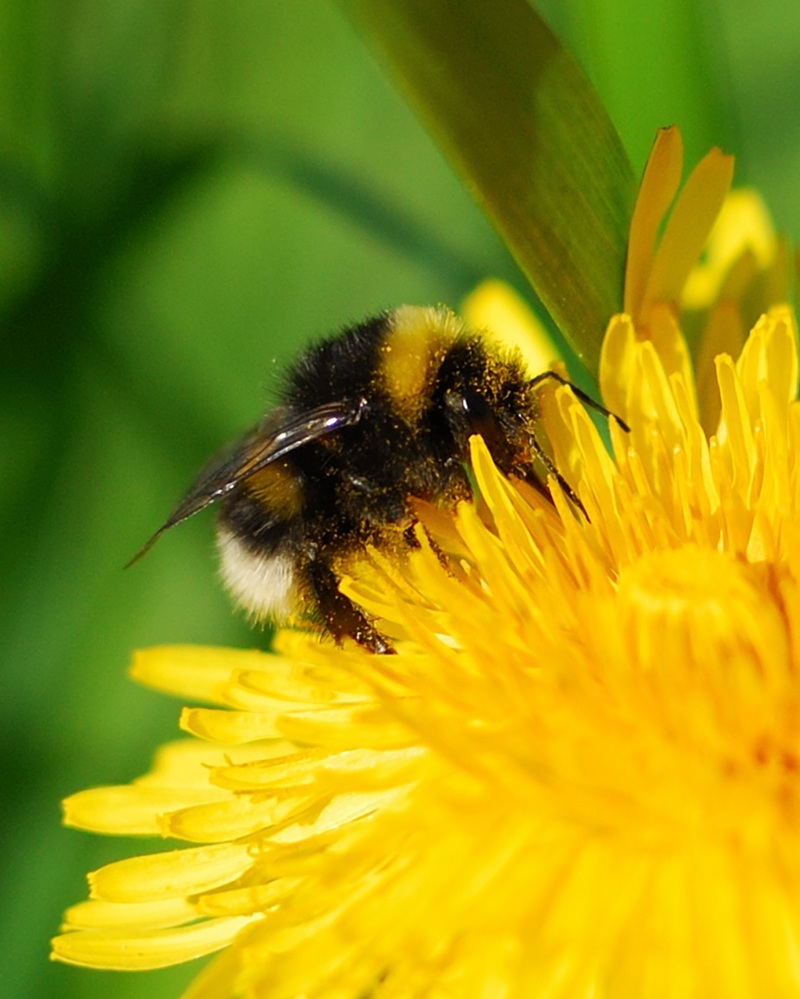Dundee University researchers have been given £1.8 million to save a third of the world’s food supplies by studying the brains of bees.
Bumblebee and honeybee populations declined dramatically over the past few years and staff at the university are to investigate whether pesticides have an effect on the cognition of bees, causing them to die.
In the UK, bee numbers fell by 15% in the two years leading up to April last year.
Total collapse of the bee population would cost the country £440 million a year.
Doctors Chris Connolly and Jenny Harvey will lead research on one of nine projects to share £10 million funding from the Insect Pollinators Initiative during National Insect Week.
The initiative aims to explore threats to pollen-bearing insects and to protect the ecosystem from any harmful changes.
The team will investigate the “synergistic impact of sub-lethal exposure to industrial chemicals on the learning capacity and performance of bees’ brains.”
While pesticides are screened to ensure they are non-lethal to bees before they are passed for use, Dr Connolly said the Dundee team, including researchers from across the UK, will examine whether a combination of chemicals used in agriculture may cause hidden brain damage to bees.
“Many insecticides work by interfering with information flow in the brains of insects either increasing or decreasing their brain activity,” he said.
“We will be looking at whether chronic exposure to chemicals used to control mites, combined with levels of agricultural pesticides that are not themselves lethal, may act together to magnify their affects on bee brain function.”
He added, “We rely on a varied cocktail of pesticides to protect our food supply and homes from pest damage.
“Pesticides are also used to protect honeybees from mite infestation.
“It is believed that pesticides, when present in isolation, at the levels thought to exist in the environment, do not kill bees.
“Our hypothesis is that these chemicals may have a synergistic effect on the brain function of bees.”
Dr Connolly said damage to the bees’ brain functions could manifest itself in a number of ways.
It may affect their ability to find their way to and from food, to communicate with each other and their ability to learn and remember where food sources are.
“If bees were to die out, then our food security would be seriously compromised,” said Dr Connolly.
“We rely exclusively on bees to pollinate such a large number of our staple foods and the only alternative, which is hand pollination, is not really an option.”
It is still not known what has caused the worldwide decline in bee numbers but Janice Furness of the Fife Beekeepers’ Association said pollinators are vital to the world’s food supply.
“In the long term it’s a disaster, because they are responsible for a third of the world’s food in terms of pollination,” she said.
“There is a tendency for people to just think about bees as producers of honey but they are far more important than that in terms of pollination.
“It is not at all certain what is causing it although it is plausible that it is to do with pesticides.”
Mrs Furness, who lives at Boarhills by St Andrews, said keeping bees became much harder as disease and mites during the recent cold weather have devastated much of the bee population.
“I lost about half of my colonies, which I think is about average, but I know of one commercial beekeeper who lost 80% of his,” she said.
She added that diseases such as European and American foulbrood are dangerous but the Varroa mite has caused most harm in Scotland.ParasiteAlthough keepers can prevent too much harm by treating hives twice a year to keep parasite numbers at a manageable level, wild hives are more vulnerable.
“Wild colonies in particular have died out and that is affecting the general population,” said Mrs Furness.
“A lot of mating would be done by wild drones but if you’ve only got one hive in the garden then a virgin queen will probably be mated by one of her brothers.
“This has a lot of inbreeding implications so it’s a big problem.”
Dr Connolly said the research may also have implications for humans.
He said, “If synergetic effects are discovered to impair the brain function of bees, this information may influence the co-ordination of pesticide use.
“We must then also look at whether the combination of these chemicals has the same effect on humans.
“Although pesticides are designed not to work on humans, synergistic interactions may amplify toxicity as much as 1000-fold.”
Photos used under Creative Commons licences courtesy of Flickr users fileacn and s evenseth.
